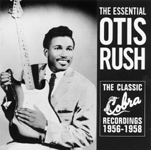|
Otis Rush The Essential Otis Rush: The Classic Cobra Recordings 1956–1958 Fuel 2000 302 061 077 2 |

|
Otis Rush’s career reads like a blues song: Lots of talent, enough to get him included with luminaries such as Muddy Waters and John Lee Hooker as pioneers of the Chicago style of blues, but unlike the other two, nothing but bad luck career-wise.
Rush, still bouncing around at the tender age of 67, has just signed a new record deal with House of Blues Records, and perhaps that will help him find the popularity he so richly deserves. In the interim, Fuel 2000 Records has cleaned up and released a big chunk of Rush’s three-year tenure with Eli Toscano’s Cobra Records, which features some of his best work. Toscano drew Rush in with a huge drawing card: Willie Dixon, who was tired of being underpaid by the Chess brothers and put his trust in Toscano (it would turn out to be a bad move).
Rush moved to Chicago at the age of 14 from his native Philadelphia, Mississippi. He has a unique style of playing guitar: He’s a lefty who learned to play a guitar strung for a right-hander. So Rush is probably one of the only guitarists of note who plays with the strings in reverse order.
Not that it matters: The Cobra sessions produced by Dixon resulted in some of the rawest guitar playing and most powerful vocalizing of which Rush is capable. The whole thing kicks off with the classic "I Can’t Quit You Baby," where Rush’s vocals leave you with chills and his guitar phrasings leave you in awe.
There are two alternate studio takes of the opener here (one is a hidden track), and there are other alternate takes of other Rush tunes for comparison shoppers — some of them feature different mixes, others feature different solos.
Dixon wrote six of the first eight tracks. "Sit Down Baby" is just an alternative title for "Little Red Rooster," though "Rooster" appears as an alternate take (with that title and with the writing credit to Dixon). But Rush did not embrace some of Dixon’s songs, and for good reason: The man responsible for writing a lot of major hits for a lot of artists had a few clunkers in him as well, and Rush got stuck with such garbage as "Violent Love." Listening to his vocal, it sounds like he’d rather do anything other than sing the song. And, as Rush grew frustrated with Dixon’s choice of tunes, he’s quoted in the liner notes as saying, "Man, this is some horseshit all over. I didn’t know whether to scratch my watch or wind my head by now."
When Rush’s songs were recorded, the passion increased a thousand-fold. The guitars became more prominent in the mix, and all the pieces fell together. One listen to "Three Times a Fool," one of the best songs on this collection, shows that Rush has the capability to make his own kind of music. His other big hit, "All Your Love (I Miss Loving)," starts off with a guitar riff that seems to draw on George Gershwin’s "Summertime." The Latin feel moves into a rollicking swing beat, all driven by Rush’s commanding guitar. He wrote the song one night on the way to the studio and laid it down with Ike Turner’s band.
This is the quintessential Otis Rush collection. It’s a damn shame that he didn’t parlay such a strong batch of songs into a fruitful career like some of his brethren, but at least Rush is still around to give it another try. Whether you are big on Chicago-style blues or not, this CD is a fine — indeed, essential — addition to any blues collection.
— Lou Friedman
| ©2001 Blues Access, Boulder, Colorado, USA |